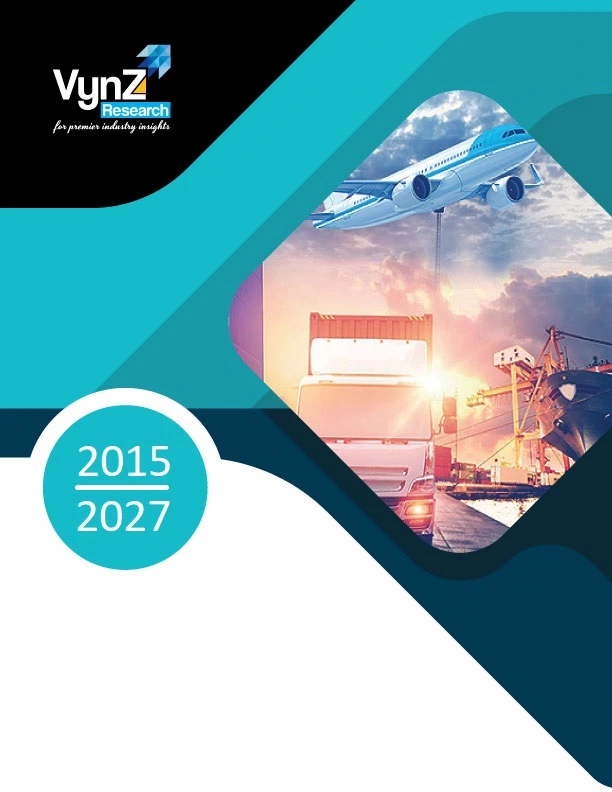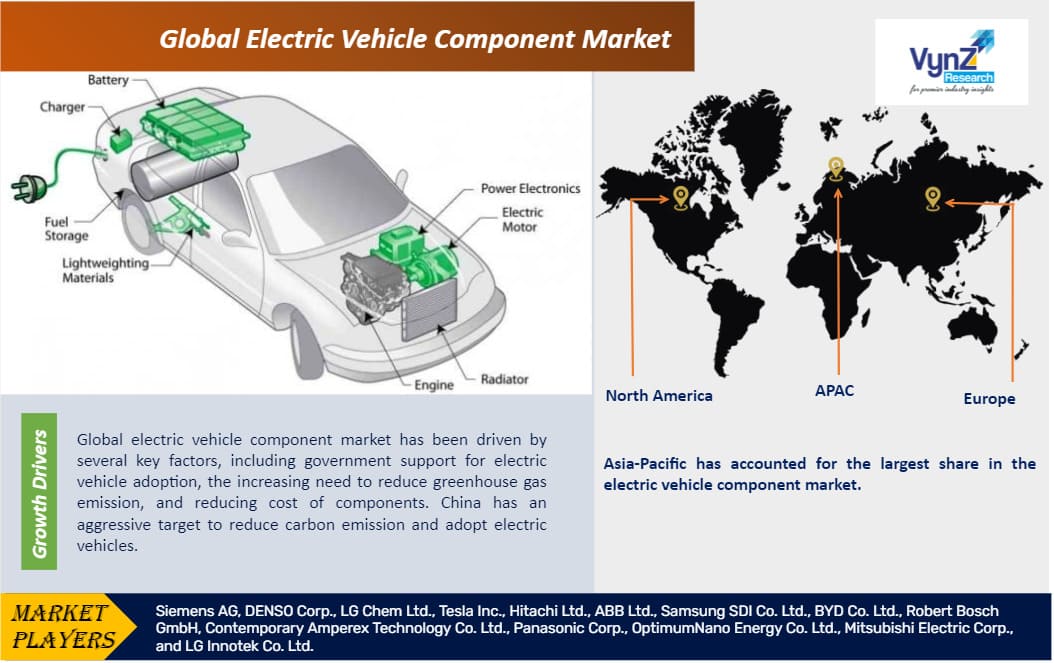| Status : Published | Published On : Apr, 2024 | Report Code : VRAT4063 | Industry : Automotive & Transportation | Available Format :

|
Page : 169 |

Global Electric Vehicle Component Market – Analysis and Forecast (2025-2030)
Industry Insights by Component (Battery Pack [Battery Cell, Battery Management System (BMS), Battery Thermal Management System, Others], Motor, Controller, Electric Vehicle Supply Equipment, DC–DC Converter, High-Voltage Cable, Power Distribution Module, Thermal Management System, Vehicle Interface Control Module), by End Use (OEM, Aftermarket) and by Geography (North America, Europe, Asia-Pacific (APAC), Rest of the World (RoW))
Industry Overview
The Global Electric Vehicle Component Market was valued at USD 24.5 billion in 2023. Government support for electric vehicle adoption, increasing the need to reduce greenhouse gas emissions,s and reducing the cost of components, propelling the growth of the market.

Electric Vehicle Component Market Segmentation
Insight by Component
Based on components, the global electric vehicle component market is categorized into battery packs, motors, controllers, electric vehicle supply equipment, dc–dc converter, high-voltage cables, power distribution modules, thermal management systems, and vehicle interface control modules, wherein battery pack category held the largest share in the market in 2018. This is because battery packs account for around 34–51% of the overall cost of electric vehicles, which makes the battery pack category the largest revenue contributor compared to others in the market.
The battery pack is further sub-segmented into battery cells, battery management systems (BMS), battery thermal management systems, and other ancillary components. Among these segments, the battery cell was the largest revenue generator in 2020 in the market.
Insight by End Use
The electric vehicle component market is segmented based on end-use into original equipment manufacturer (OEM) and aftermarket. Between these two end users, the higher demand for electric vehicle components was witnessed by the OEMs category in the market in 2020, owing to the increasing manufacturing of electric vehicles across the globe. However, the aftermarket category is expected to grow faster during the forecast period.
Global Electric Vehicle Component Market Report Coverage
|
Report Metric |
Details |
|
Historical Period |
2018 - 2023 |
|
Base Year Considered |
2024 |
|
Forecast Period |
2025 - 2030 |
|
Market Size in 2024 |
U.S.D. 24.5 Billion |
|
Revenue Forecast in 2030 |
U.S.D. XX Billion |
|
Growth Rate |
XX% |
|
Segments Covered in the Report |
By Component, By End-Use |
|
Report Scope |
Market Trends, Drivers, and Restraints; Revenue Estimation and Forecast; Segmentation Analysis; Impact of COVID-19; Companies’ Strategic Developments; Market Share Analysis of Key Players; Company Profiling |
|
Regions Covered in the Report |
North America, Europe, Asia-Pacific (APAC), Rest of the World (RoW) |
Industry Dynamics
Electric Vehicle Component Market Trends
Rising preference for induction motors and a shift toward lithium-–nickel–manganese–cobalt (NMC) oxide batteries from lithium–iron phosphate (LFP) batteries are the key trends observed in the electric vehicle component market, globally.
Electric Vehicle Component Market Growth Drivers
The global electric vehicle component market has been driven by several key factors, including government support for electric vehicle adoption, the increasing need to reduce greenhouse gas emissions, and reducing cost of components.
China has an aggressive target to reduce carbon emissions and adopt electric vehicles. For battery electric vehicles, subsidies were around 40 to 60% of the vehicle cost. The country implemented a dual-credit policy that targets automakers selling passenger vehicles based on their average fuel consumption credits and new energy vehicle credits. This applies to the manufacturers of 30,000 vehicles or more annually. All the above-stated factors help in the growth of the electric vehicle component market.
Electric Vehicle Component Market Restraints
The high initial cost of electric vehicles is hindering the growth of the electric vehicle component market, globally.
Electric Vehicle Component Market Geography Insight
Geographically, Asia-Pacific has accounted for the largest share in the electric vehicle component market, globally and is predicted to grow significantly during the forecast period. The growth of this market is attributed to the huge adoption of electric vehicles in the region, led by China, more than any other region. Increasing environmental concerns, and rising government support for electric vehicles in the form of subsidies are the major factors driving the demand for electric vehicles in China.
Electric Vehicle Component Market Competitive Insight
Some of the key players operating in the global electric vehicle component market are Siemens AG, DENSO Corp., LG Chem Ltd., Tesla Inc., Hitachi Ltd., ABB Ltd., Samsung SDI Co. Ltd., BYD Co. Ltd., Robert Bosch GmbH, Contemporary Amperex Technology Co. Ltd., Panasonic Corp., OptimumNano Energy Co. Ltd., Mitsubishi Electric Corp., and LG Innotek Co. Ltd.
Siemens AG is a German multinational technology conglomerate which focuses on distributed energy resources, industrial automation, rail transport and others.
DENSO Corporation is a global automotive components manufacturer headquartered in the city of Kariya, Aichi Prefecture, Japan.
Recent Developments by Key Players
Siemens Limited shall provided rail electrification technologies for a 42-kilometer-long stretch, that includes the longest rail tunnel (12.8-kilometers) at Pir Panjal range, on the Udhampur-Srinagar-Baramulla Rail Link. The project is part of the Jammu-Udhampur-Katra-Quazigund-Baramulla Railway line of the Indian Railways which marks the largest construction of mountain railway line since India’s independence, with a length of 345 kilometers and at a height of approximately 1,700 meters above sea level.
Siemens Limited’s shall include the design, supply, installation, engineering, testing and commissioning of 25kV overhead equipment and associated works.
DENSO CORPORATION (a leading mobility supplier) and United Semiconductor Japan Co., Ltd. (a subsidiary of global semiconductor foundry)collaborated to produce insulated gate bipolar transistors which have entered mass production at the 300mm fab of USJC.
Forecast Parameters
- Identifying variables and establishing market impact.
- Establishing market trends regionally.
- Analyzing opportunities and market penetration rates by understanding product commercialization, and regional expansion.
- Analyzing demand and supply trends and changes in industry dynamics to establish future growth.
- Analyzing sustainability strategies adhered to by market participants in an attempt to determine the future course of the market.
- Analyzing historical market trends and super-imposing them on the current and future variables to determine the year-on-year trends.
- Understanding adoption, production, export, import, and regulatory framework.
Data Validation
- Estimated and forecasted data was validated through industry experts.
- Apart from industry experts, data triangulation methods were used for validation.
The bottom-up and top-down approach has been used for the estimation and forecast of market data, whereas the top-down approach was used for validation.
- Demand, as well as supply-side surveys, were conducted to understand the industry dynamics and data validation.
Primary Research
VynZ Research conducts extensive primary research to understand the market dynamics, validate market data, and have key opinions from industry experts. The key profiles approached within the industry include, CEO, CFO, CTO, President, Vice President, Product Managers, Regional Heads, and Others. Also, end-user surveys comprising consumers are conducted to understand consumer behavior.
The Electric Vehicle Component Market report offers a comprehensive market segmentation analysis along with an estimation for the forecast period 2025–2030.
Segments Covered in the Report
- Component
- Battery Pack
- Battery cell
- Battery management system (BMS)
- Battery thermal management system
- Others
- Motor
- Controller
- Electric Vehicle Supply Equipment (EVSE)
- DC-DC Converter
- High-Voltage Cable
- Power Distribution Module (PDM)
- Thermal Management System
- Vehicle Interface Control Module (VCIM)
- Battery Pack
- End Use
- Original Equipment Manufacturer (OEM)
- Aftermarket
Geographical Segmentation
- North America
- U.S.
- Canada
- Mexico
- Europe
- Germany
- U.K.
- France
- Italy
- Spain
- Russia
- Rest of Europe
- Asia-Pacific (APAC)
- China
- Japan
- India
- South Korea
- Rest of Asia-Pacific
- Rest of the World (RoW)
- Brazil
- Saudi Arabia
- South Africa
- U.A.E.
- Other Countries
.png)
Source: VynZ Research
.png)
Source: VynZ Research
Frequently Asked Questions
Purchase Options
Latest Report
Research Methodology
- Desk Research / Pilot Interviews
- Build Market Size Model
- Research and Analysis
- Final Deliverabvle
Connect With Our Sales Team
- Toll-Free: 1 888 253 3960
- Phone: +91 9960 288 381
- Email: enquiry@vynzresearch.com
Electric Vehicle Component Market
